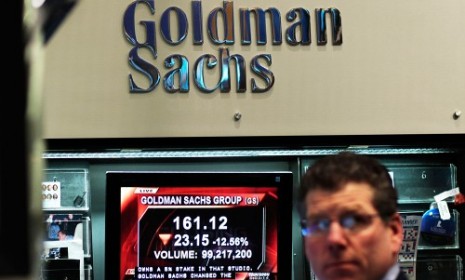The case against Goldman Sachs: A guide
Why the SEC is going after the Wall Street powerhouse, and what it means for the financial industry

A free daily email with the biggest news stories of the day – and the best features from TheWeek.com
You are now subscribed
Your newsletter sign-up was successful
The Securities and Exchange Commission took on Wall Street titan Goldman Sachs on Friday, filing a potentially explosive civil lawsuit accusing the investment bank and one of its mortgage traders, Fabrice Tourre, of fraud. (Watch a CBS report explaining the SEC's charges.) Here's a brief rundown of the charges, and what they could mean for Goldman, Wall Street, and financial reform legislation:
What is Goldman accused of?
The SEC says that Goldman created and sold a package of mortgage-backed securities to investors in 2007 without telling them that the person who picked or approved the securities, hedge fund manager John Paulson of Paulson & Co., was betting heavily that they would fail. Goldman brought in independent fund manager ACA Management to help pick the portfolio, allegedly to make the deal seem more trustworthy. But the SEC says Goldman misled ACA, too, not disclosing that deal "sponsor" Paulson was betting against, not on, the investments. Paulson's role was withheld from investors, too.
The Week
Escape your echo chamber. Get the facts behind the news, plus analysis from multiple perspectives.

Sign up for The Week's Free Newsletters
From our morning news briefing to a weekly Good News Newsletter, get the best of The Week delivered directly to your inbox.
From our morning news briefing to a weekly Good News Newsletter, get the best of The Week delivered directly to your inbox.
What's Goldman's defense?
That the investors who bought the securities were given "extensive information" about the securities they were investing in, and were "sophisticated" enough to know that somebody was going to take the opposite side of their bet. Also, Goldman says that while it earned $15 million in fees, it lost $90 million in the deal, although it didn't explain how.
Who else lost, and made, money on the deal?
The investors collectively lost $1 billion, with the primary losers being ACA Capital and German bank IKB. Paulson & Co. earned almost $1 billion in profit.
A free daily email with the biggest news stories of the day – and the best features from TheWeek.com
Is Paulson being charged?
No. Legal scholar Alan Dershowitz thinks that was a somewhat arbitrary choice by the SEC, though, saying in The Daily Beast that Paulson "could easily have been charged with conspiracy to defraud."
How damaging is this for Goldman?
Analysts say the hit to Goldman's "seemingly invincible" reputation could be much worse than any punitive damages. Given how important trust is on Wall Street, "it's very bad for business" if your clients think "you are doing shady things," says NYU law professor Marcel Kahan. And while any SEC fine would be "really small potatoes" for the firm, Goldman's stock price tumbled 13 percent on the news Friday, erasing more than $10 billion in market capitalization. Also, Britain and Germany are mulling their own investigations, based on the SEC allegations.
Are other Wall Street banks facing similar SEC charges?
It's certainly possible. SEC enforcement chief Robert Khuzami says the agency is stepping up its anti-fraud actions, and specifically looking at "similar deals" involving other Wall Street firms. Until Friday, Goldman employees were able to "sleep soundly after collecting their huge bonuses," says The New York Times in an editorial. Since Goldman wasn't the only bank betting against its own mortgage products, "others on Wall Street may have a harder time sleeping" now, too.
What are the politics of this case?
The SEC is an independent agency, but political strategists and banking lobbyists say the Goldman fraud allegations could help the Democrats pass a financial reform bill. The House passed its version last year, and the Senate finance committee recently sent its version to the full Senate (on a party-line vote) for debate this week. Some Republicans and TV pundits suggest that the announcement was timed to help secure the bill's passage. Business Insider's Henry Blodget says the SEC also might have rushed out the lawsuit to divert attention from a damning internal review of the agency's enforcement over the past few years.
Sources: Wall Street Journal, NY Times (2), LA Times, Reuters, Daily Beast, Bloomberg, Business Insider, Naked Capitalism